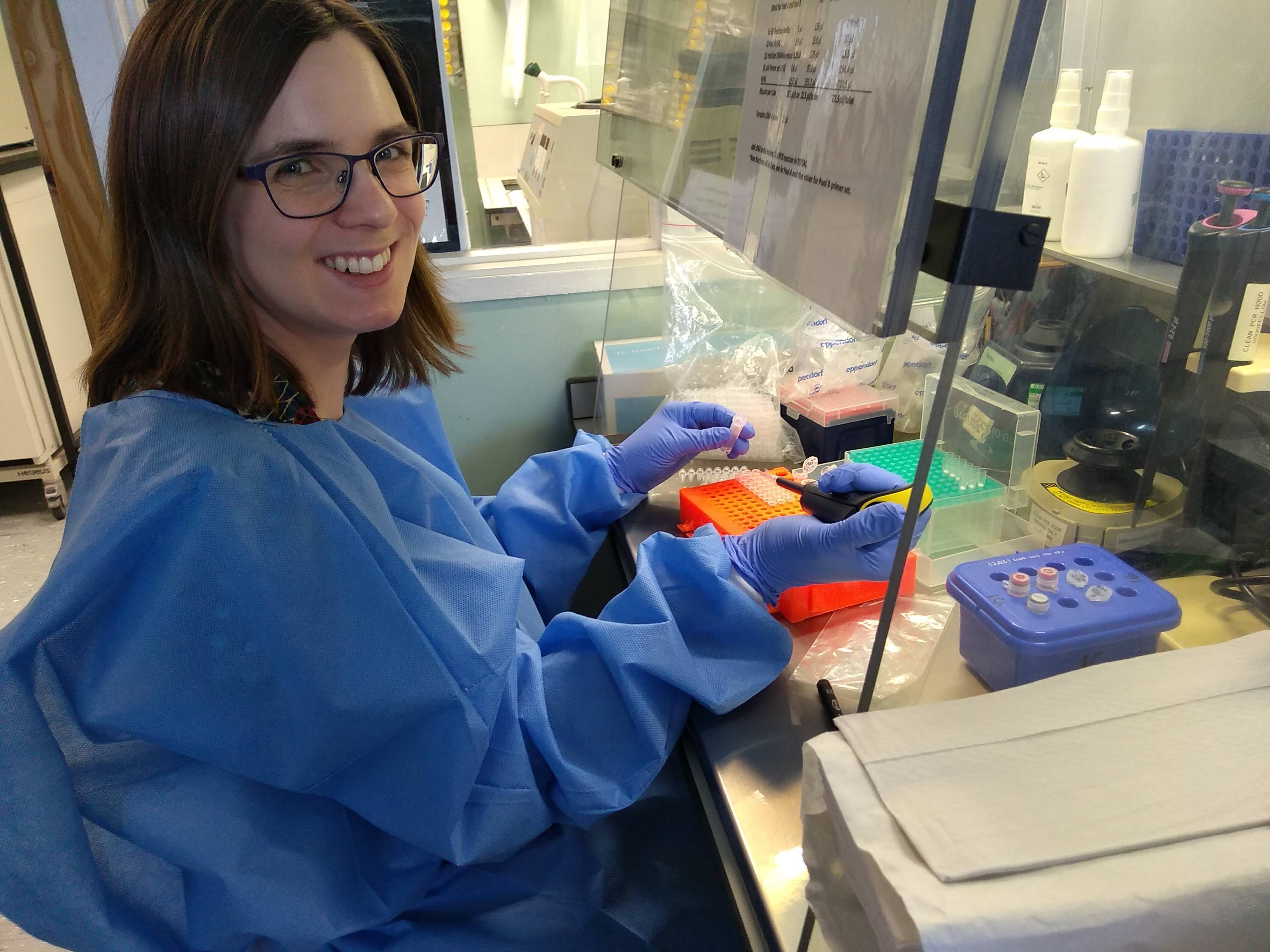Mixed feelings for Caius Covid researcher
- 01 March 2022
- 4 minutes
“Uncertainty” is the feeling Dr Charlotte Houldcroft shares when discussing the removal of Covid-19 restrictions in England, even though she, like all of us, would like to put the pandemic in the past.
Dr Houldcroft, a teaching associate of Gonville & Caius College and a Research Associate in the Department of Medicine, is a virus evolution researcher, usually focusing on DNA viruses.
However, in the Covid-19 pandemic, she has put her skills to use to sequence the shifting genetics as fast as possible to provide ‘real time’ data to map its spread and detect mutations. She was interviewed on the University of Cambridge website in April 2020.
Dr Houldcroft says: “I feel a lot of uncertainty, because variants seem to appear from out of nowhere. The situation could change very fast.
“We will eventually get some other variant that has some different properties from omicron. We don’t know what the combination of properties will be. And when it arrives, you’ve only got two weeks, a month’s notice, before it’s completely dominant wherever you are.”
There are reasons to be optimistic due to the vaccination programme and as the weather improves towards spring, Dr Houldcroft says.
“The UK has accrued a lot of immunity, both the good way, through vaccination, and the hard way, through rampant omicron transmission,” she adds.
“People have got both the high antibody response to the spike protein, which is what the vaccine gives us, but also the multifunctional immunity to lesser viral proteins that comes from a natural infection and that helps the immunity that comes from the vaccination.”
Dr Houldcroft says prior relaxations mean any ‘exit wave’ following the end to restrictions may be small. Meanwhile, tracking the virus and its evolution will be more challenging due to the reduction in testing and reporting, although the Office for National Statistics Covid-19 infection survey should continue to provide some indication, albeit with a delay of seven to 10 days.
“We’ll have a less timely insight into what’s going on than we did before,” Dr Houldcroft says.
“We might not get such a big wave as we expect. Although it wouldn’t surprise me if the ONS prevalence estimates might go back to 1 in 20 over the next month or so.
“I would expect the rates to drop quite low over the summer, more like a seasonal coronavirus, but it all depends on whether we get a new variant.
“Eventually it should settle into the same pattern that the seasonal coronaviruses have, where they cause coughs and colds and they do that from around November to March.”
I’m in favour of putting Covid in the perspective of other respiratory viruses, but I am still aware that it’s worse than other respiratory viruses
Dr Houldcroft has mixed feelings about the phrase ‘living with Covid’, given the virus causes mild infection in most vaccinated people, yet others experience more severe illness and the extent of long Covid remains unknown.
“I’m in favour of putting Covid in the perspective of other respiratory viruses, but I am still aware that it’s worse than other respiratory viruses,” she adds.
“We have never measured and recorded viral epidemics in as much detail as we have this Covid epidemic. And I suspect if the general public knew how much morbidity and mortality came out of other common respiratory infections which we do nothing for really, they would be horrified.
“I do wonder how the public would feel if we had this extremely granular data about respiratory syncytial virus (RSV) in small children or influenza in the population as a whole.
“There’s a difficulty in trying to get Covid into perspective now that there are more treatments and vaccination, while also respecting that we’ve added a whole extra deadly respiratory virus to the mix of viruses going around that we’ve never dealt with before in human history.
“This is novel. And we’re just accepting that that’s now a new leading cause of death and has displaced a lot of ‘flu deaths. It’s still killing more people than ‘flu would in an average year.”

Dr Houldcroft’s research interests are in virus evolution from a scale of weeks (within a single patient) to millennia (between humans and Neanderthals). Host-virus interactions, including T cell responses to DNA viruses after organ transplantation are another area of research.
She says: “It’s been fantastic to get some experience of RNA viruses, it’s been great to be able to use my skills, I’ve made amazing friends and it’s been wonderful to be part of a big UK and international viral collaboration.
“I’ve gained a lot, hope I’ve contributed something, but it’s confirmed for me my real love is the viruses that almost everyone is infected with that act on a lifetime course to cause disease. The things that cause chicken pox and glandular fever and things like that, rather than this particular pandemic pathogen.”
Dr Houldcroft has a new preprint about the evolution of Herpes simplex virus, the virus which causes cold sores: https://www.biorxiv.org/content/10.1101/2022.01.19.476912v1
She can be found on Twitter: @DrCJ_Houdcroft


